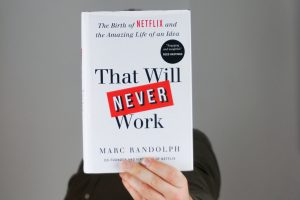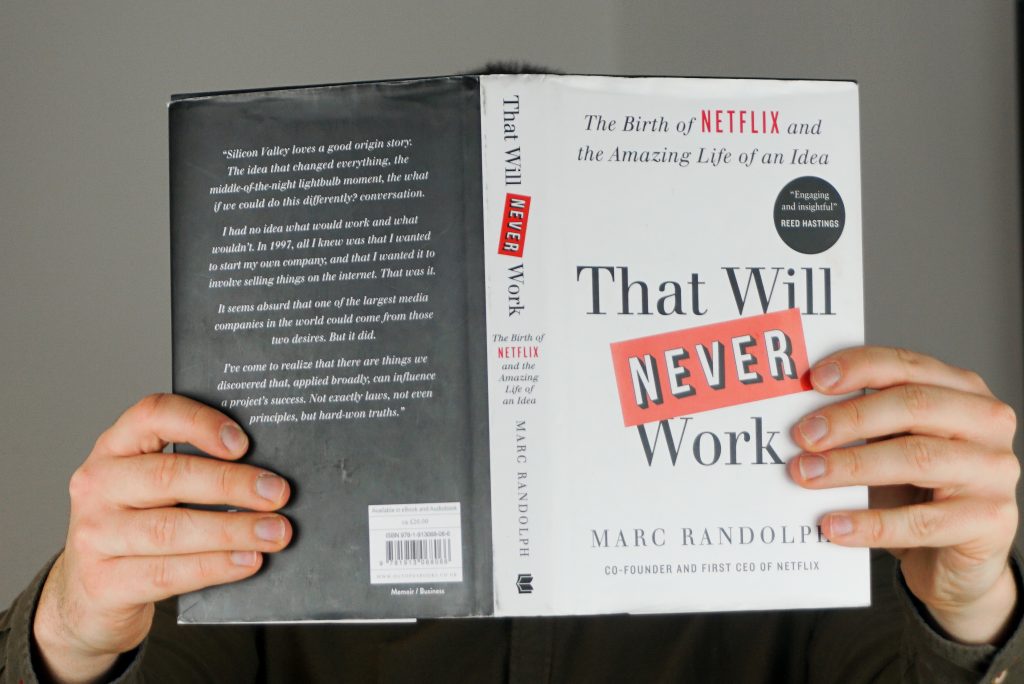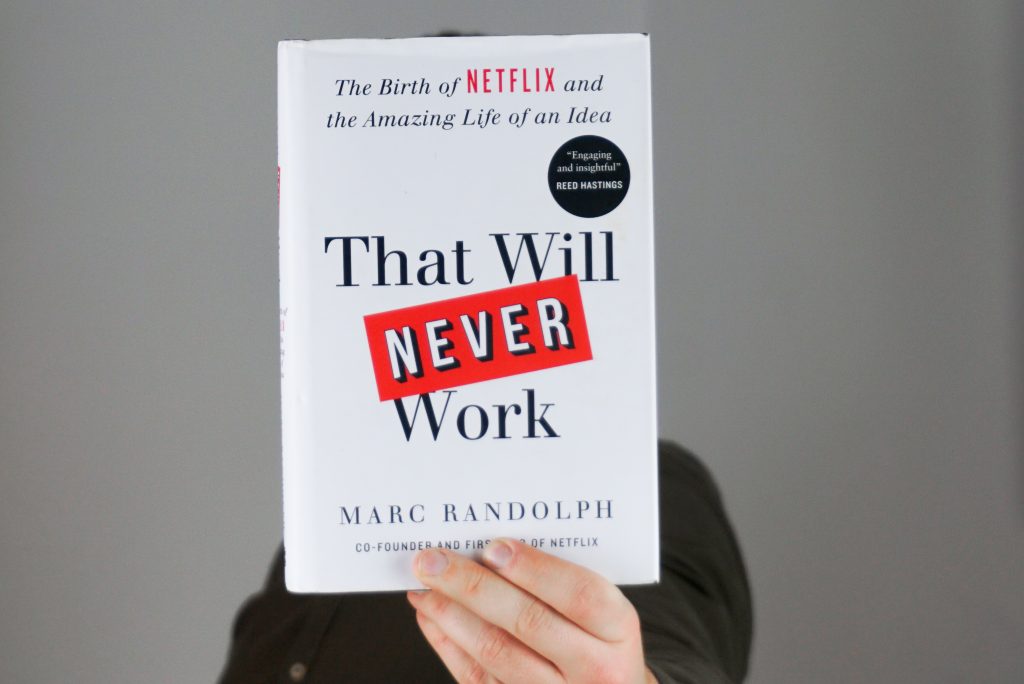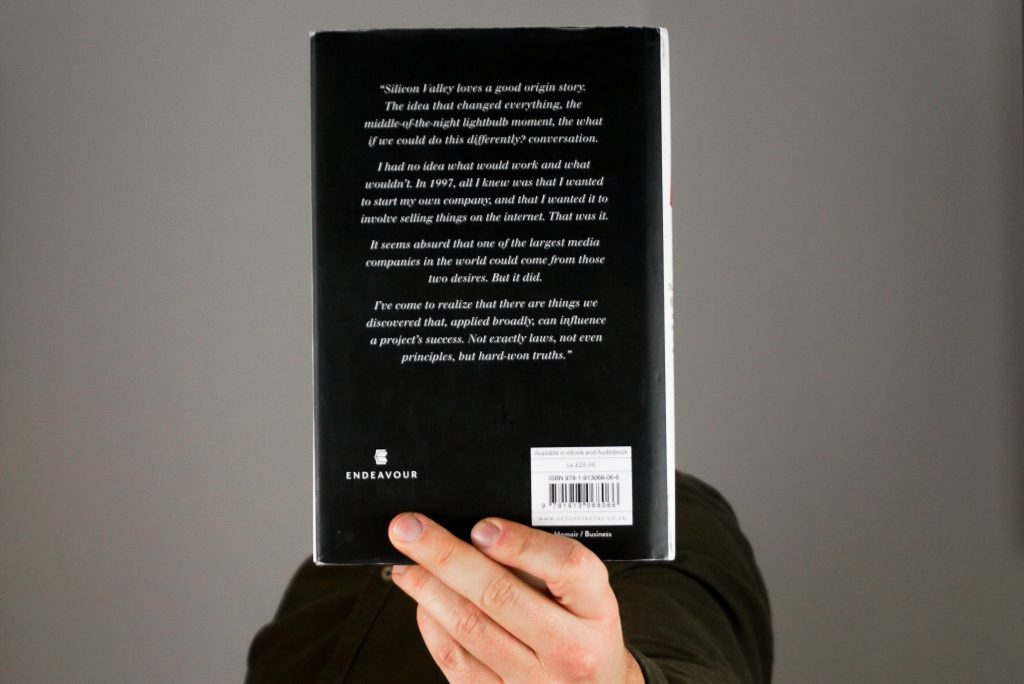That will never Work Book from Marc Randolph – My Top 5 Learnings
Rating, Summary, Author & a lot more
Page Calculator:
Top 5 Keylearnings from That will never work
The book That will never work is the autobiographical story of the creation of Netflix. The book was written by one of the founders Marc Randolph. Here are my top 5 keylearnings:
1. Startup is riding a roller coaster. The author describes the real startup life like no other. Startup is not table football and Aperol Spritz in the evening. You are in the office from 8 a.m. to 10 p.m. There is no weekend, vacation or time out. One day the company earns real money, the next day the investor threatens to turn off the money. Startup is gray hair, little sleep, difficult conversations and walking on all fours. If you can’t do that, you shouldn’t found a company.
2. Don’t fall in love with your product. Netflix is one of the companies that have had to change their business model several times in a short period of time. First, they sold & rented DVD’s on the Internet. Then they made the switch to online streaming and ultimately to the production of their own series. So don’t fall in love with your product / service, but with the problem that you solve for your customers.
3. Be brave and pursue your vision. Although Netflix initially made more revenue from selling DVDs and not lending them, they decided to stop selling and send users to Amazon. It wasn’t the vision to sell DVDs over the internet. They wanted to make DVD rental as easy as possible. In addition, more money could be made in the long term.
4. Technology is key. When Netflix started there were about 1000 DVD’s. Most people watched their films on videotapes. But shipping video cassettes would have been far too expensive. That’s why Netflix decided to only offer DVDs. So you are banking your entire business model on the growth of DVDs.
5. Trust your gut feeling. Marc Randolph started Netflix mainly because he wanted to do something with the internet. Every day he thought about which services or products one could offer. And every day he heard the words from people and especially from his wife: That will never work! In the end, it more than worked. Netflix is one of the most valuable companies in the world.
 Who is Marc Randolph?
Who is Marc Randolph?
Marc Randolph became known through founding Netflix. He and Reed Hasting founded the company. Shortly after the IPO, Marc gave up his CEO position to Reed. Today he is active in the startup world as an author, speaker, lecturer and investor. Most recently, he co-founded the analytics software company Looker Data Sciences, which was sold to Google for $ 2.6 billion.
Applicability of what has been learned from That will never work
Because the book is autobiographical, there aren’t many guides or practical tips to “do it yourself”. Nevertheless, the book is very helpful reading for startup founders. It shows how stony and arduous the path to success can be. Still, it’s worth the effort. 50 months after the Netflix website was launched, the company went public. Even though she witnessed the dotcom crashes.
At the end of the That Will Never Work book, Marc Randolph gives his rules for success with:
- Do at least 10% more than is required of you.
- Never tell half-truths about things you don’t know.
- Always be polite and always consider the pros and cons.
- Don’t complain – always take constructive criticism.
- Don’t be afraid to make decisions when you have all the facts as a basis.
- Quantify wherever possible.
- Be open, but always skeptical.
- Be quick
Comprehensibility of the content from That will never work
The book is not a non-fiction book but rather an autobiography or the history of Netflix. I was fascinated by the author’s honest and private insights. He describes his thoughts and emotions in a great way.
The book is divided into 18 chapters on 300 pages. Which makes it pleasant to read. That’s around 17 pages a day. Each chapter shows how far away the Netflix website is on launch day. So one looks forward to the start of the company from chapter to chapter.
If you want to found a startup or are already at it, you should definitely read the book. Marc Randolph gives authentic insights into the real life of a startup. He drove to the office every morning at 8 a.m. Was there until 6pm. Went home to eat with his family and put his children to bed. At 8 o’clock he drove to the office again for 2-3 hours. He and his wife bought a new house and took on a lot of debt. All in the knowledge that Netflix could go broke overnight. As a founder you have to have strong nerves.
That will never work explained in 500 Words

Most people know this story of how Netflix came about: Reed Hasting, one of the founders of Netflix, had rented several video cassettes from Blockbuster Movies. He had forgotten to bring her back in time. When he brought the films back to the store after a few weeks, he paid nearly $ 40 in overdraft fees. He thought that couldn’t be, there must be better ways to do it. Then he founded Netflix.
This story sounds nice and you want to believe it. It almost makes the making of Netflix look like a necessity. But the truth is, it was very different. And that is the real story of the book That will never work.
The story starts 15 months before the Netflix website goes live. At the time, there wasn’t even the idea for Netflix, but there were countless others. The author Marc Randolph drives to work every day with his friend & mentor Reed Hasting. Every day he comes up with a new idea for a startup and discusses it with Reed. After 30 seconds at the latest, Reed explains why this cannot work. From personalized dog food to an online shop for shampoos, everything was there.
One evening Marc is watching a Disney film with his daughter and half asleep he comes up with the idea of sending video cassettes online.
He immediately discusses the idea with Reed, who is not immediately against the idea. He mentions that he first had to pay $ 40 overdraft fees. You check the cost of the project. You have to buy the license for the film and the shipping there and back.
Video cassettes are really big. They quickly realize that it doesn’t pay off. By chance they read from DVD’s. They are supposed to become the next trend and replace video cassettes. You get a DVD and send it to Reed’s home in a simple stamped envelope. If this test works, you have found a working business model.
The DVD arrives intact. It’s time to start the engines. Reed & Marc found the company, build a team and start work. The website netflix.com goes live on April 14, 1998. It is an instant success. At the beginning, DVDs can be bought and borrowed.
After a while you will notice that more sales are made from selling DVDs than from lending them. You have to choose. In the long run, they can make more money by renting the films. You decide to do a cooperation with Amazon. They agree that Amazon users want to rent the films to Netflix and that Netflix users want to buy the films to Amazon.
They quickly realize that they have made a bad deal. Amazon made the link difficult to find and hardly any traffic arrives at them.
But there is no time to get upset about it. You have to create a sustainable movie rental business model. They experiment a lot until they arrive at the best solution: Subscription
In autumn 1998, Reed asked Marc for an interview. After a PR disaster and another bad cooperation, Reed realized that it couldn’t go on like this. Reed wants Marc to hand over his position as CEO to him. After a few emotional moments, Marc realizes the need and gives his post to Reed. Marc remains with the company as president.
The company is writing good numbers and everything is going well. There are takeover talks with blockbuster movies. However, they run in the sand. When things are going best, the dotcom crash comes. Nobody knows how to go on, but the customers continue to borrow DVDs diligently. After the situation has calmed down again, Netflix goes public on May 23, 2002. With that, the launch of Netflix ends, and so does the book.
Why you should read That will never work when doing the Power MBA:
Marc Randolph is not only one of the founders of Netflix, but also one of the mentors in the Power MBA.
In order to be optimally prepared for these lessons, I recommend that you read his book.



 Who is Marc Randolph?
Who is Marc Randolph?